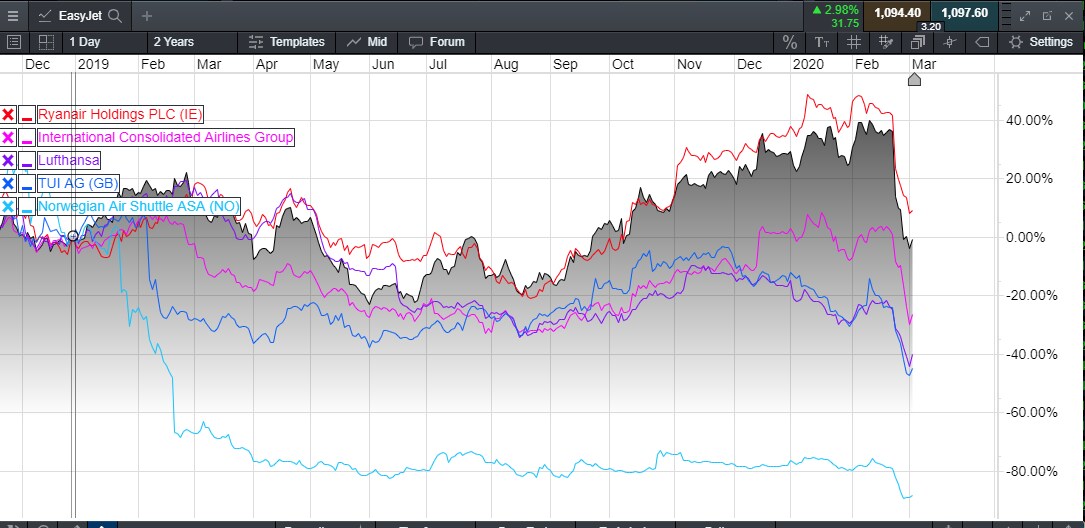The last two years have been a struggle for airlines and the travel sector, as overcapacity problems and geopolitical shocks have taken their toll on an industry that has seen a number of airlines and travel companies go under, or attempt to restructure their businesses.
From Thomas Cook and FlyBMI last year, we’ve also seen UK regional airline FlyBe make multiple attempts to restructure its business over the years, as it struggles to attract passenger numbers on its mainly domestic routes. Current events could make FlyBe’s current predicament much more acute in the coming weeks, as the new UK government mulls whether to bail the struggling carrier out.
The growing popularity of the pick and mix type of travel that allows consumers to book their holiday packages separately as well as new kids on the block like AirBnB, has seen the travel industry change beyond all recognition in the past decade, as consumers book travel, accommodation, and car hire independently.
The industry also had to contend with two high profile crashes of the Boeing 737 MAX, which caused that plane to be grounded indefinitely and increased the costs of a number of the airlines who used the plane and had to lease replacement aircraft to fill the gap.
Against this backdrop, the last thing airlines and travel companies need is the hit to revenues that the COVID-29 coronavirus will bring to its business models over the next 12 months.
As can be seen from the chart below, airlines had a difficult 2019, and thus far these declines have continued into 2020. While some are likely to be able to ride this out, other airlines have struggled and could well struggle even more if transatlantic travel gets hit in the weeks ahead.
Norwegian Air stands out with big declines of over 80% in the last 12 months. Amid concerns over its future there had been widespread speculation that it might be in the frame for takeover, with IAG said to be interested at the beginning of 2019. At the end of last year it looked to have turned a corner when it managed to post one of its best ever Q3 results with profits of $239.2m.
EasyJet share price comparison

In response to the virus outbreak and slowdown in demand for air travel, we’ve already seen British Airways and Iberia owner International Consolidated Airlines, Ryanair and easyJet announce the cancellation of hundreds of flights due to lack of demand, as consumers postpone or delay booking any travel plans. Easyjet have grounded some flights until the end of March, as have British Airways and Ryanair, with destinations across Europe being affected. If this continues into April and the summer, then we could see further pressure on the share prices of these airlines, though you also have to question how much is already priced in given the decline of the last 12 months.
It’s notable that of all the airlines, easyJet and Ryanair have outperformed the rest of the sector over the last 12 months, which suggests that despite the concerns about the virus the fallout should be manageable, as long as the outbreak effects are limited. IAG has been hit harder given its international exposure, particularly in Asia, with its shares down sharply this year.
One thing seems certain, the travel sector is in line for a bumpy ride in 2020, and with easyJet already looking to expand into the space vacated by Thomas Cook last year, we could see a slowdown in some of these plans, as airlines and travel companies recalculate their expectations for revenue and profit across 2020.
It should also be noted that despite the falls seen in the share price of easyJet, IAG and Ryanair in recent weeks, they are all above their 2016 lows in the aftermath of the Brexit referendum, unlike TUI GB, which is at a record low.
Disclaimer: CMC Markets is an order execution-only service. The material (whether or not it states any opinions) is for general information purposes only, and does not take into account your personal circumstances or objectives. Nothing in this material is (or should be considered to be) financial, investment or other advice on which reliance should be placed. No opinion given in the material constitutes a recommendation by CMC Markets or the author that any particular investment, security, transaction or investment strategy is suitable for any specific person. The material has not been prepared in accordance with legal requirements designed to promote the independence of investment research. Although we are not specifically prevented from dealing before providing this material, we do not seek to take advantage of the material prior to its dissemination.








